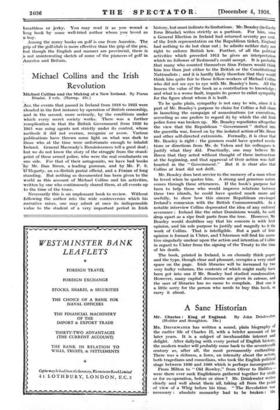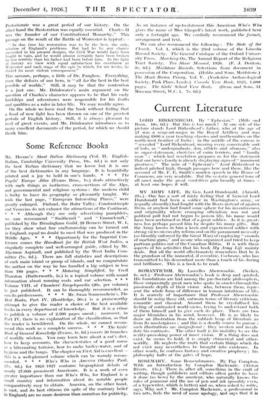A Sane Historian
Mr. Charles : Bing of England. By John Drinkwater. (Hodder and Stoughton. 18s.)
MR. DRINKWATER has written a sound, plain biography of the earlier life of Charles II, with a briefer account of his later years. It is a subject of inexhaustible interest and delight. After dallying with every period of English history, the modern reader will probably come back to the seventeenth century as, after all, the most permanently enthralling. There was a richness, a force, an intensity about the actors, both tragedians and comedians, who took the English political stage between 1630 and 1688 which is perhaps incomparable.
From Milton to " Old Rowley," from Oliver to Halifax— were there ever such Englishmen gathered together for strife or for co-operation, before or since ? Mr. Drinkwater writes clearly and well about their all, taking all from the point of view of a Whig before his time. " The Revolution Wig necessary : absolute monarchy had to be broken : the
Protectorate was a great period of our history. On the other hand the Restoration was equally essential. Charles II was the founder of our Constitutional Monarchy." This passage on the result of the Battle of Worcester is typical In due time his restoration was to be the best, the only. solution of England's problems. But had he by any chance succeeded in his present designs, the Civil War would have been fought in vain, and he would almost certainly have been broken no less terribly than his father had been before him. In tho light of history we view with equal satisfaction his overthrow at Worcester and each stage of the epic in which, for six weeks, he eluded its most violent consequences."
This savours, perhaps, a little of Dr. Pangloss. Everything, even the defeats of our hero, is " all for the best in the best. possible of worlds." Still, it may be that the contention is a just one. Mr. Drinkwater's main argument on the question of Charles's character appears to be that his early hardships and adventures were responsible for his faults and qualities as a ruler in later life. We may readily agree.
On the whole we have read the book without feeling that a flood of new light has been thrown on one of the greatest periods of English history. Still, it is always pleasant to read of great events, and Mr. Drinkwater introduces us to many excellent documents of the period, for which we should thank him.































































 Previous page
Previous page